
15 minute read
Pikom Leadership Summit 2021
Themed ‘Transforming for the New Normal’, the Summit addressed the transformation process towards digitalisation in the new normal.
The PIKOM Leadership Summit (PLS) kicked-off with bang with an energetic launch presentation followed by a host of speakers across various industries, academia and regulators.
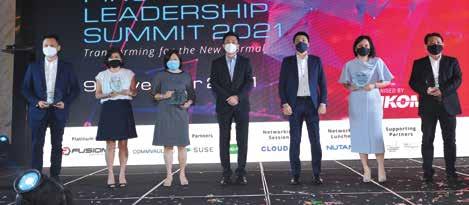
Dato’ Seri Ivan Teh,
Organising Chairman of PLS & Group Chief Executive Officer of Fusionex In his welcome address, Dato’ Seri Ivan expressed his pleasure in welcoming guests and delegates to the summit after a long hiatus due to pandemic movement restrictions. He pointed that the COVID-19 pandemic has caused unprecedented and pervasive disruption which has impacted and transformed lives, jobs, education as well as interactions and communications. Dato’ Seri Ivan said that amidst these adverse effects, the pandemic has accelerated the adoption of e-commerce, artificial intelligence (AI) and various technologies, such as cloud computing, IR4.0, cryptocurrency, fintech, digital wallets, and online payment, among others.
“As we observed for the last year and a half, there are many things that have changed and all of us are viewing things with a new lens; and that is why today’s theme ‘Transforming for a New Normal’ is apt,” said Dato’ Seri Ivan.
In analysing the response of people towards the pandemic, he pointed that there are different categories of characters. The first being those who say that the pandemic has not affected them adversely, with not much changes to their lives. The second category are people and businesses that have been severely impacted by the pandemic, be it mentally, physically, socially, economically and financially. The third category are businesses and people who have thrived amidst the COVID-19 and benefitted during the pandemic such as those offering video conferencing tools, e-commerce providers and online businesses, among others.
He expressed that we should all learn from the past lessons and prepare for the future, and consider what we can do together as a community and ecosystem to do much better for Malaysia.
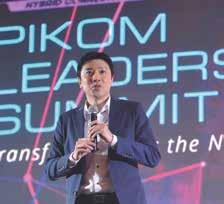
“It is my hope that over the next few years we can come together – we believe that Malaysia has all the right ingredients, support from the government, great industry players like yourselves and abundance of talent, and academia, not forgetting funding and financing to make our economy and digital transformation thrive,” stressed Dato’ Seri Ivan.
“If there is one silver lining that came from the pandemic, it is evidence that digital transformation is inevitable and it has helped us to stay connected,” he added.
He pointed our several prominent trends in today’s environment which include hybrid work in a flexible environment; a need for a hyperconnected business environment that transcends omnichannels that are connected through a data fabric; the need of businesses for a powerful productivity platform with digital tool and collaborations; and, looming cyber security threats which call for data protection.
Dato’ Seri Ivan reminded that whilst we are passionate about the work we do, work and opportunities can come and go, and hence, not to be disheartened by challenges.
Danny Lee,
PIKOM Chairman In his speech, Danny expressed that IT has become an integral part of work, life and leisure today. He says that transformation through digital technologies is definitely the way forward.
“What we hope to achieve is this – no matter how challenging technology adoption and advancement seems to be amidst the global pandemic, there is always space to focus on new solutions, business agility, and create new success stories,” Danny stressed.
He explained that the PIKOM Tech Fair, launched in 2021, is the first-ever large-scale online exhibition in Malaysia featuring an inclusive, consolidated digital platform comprising an e-commerce marketplace, exhibition space, B2B matching space, and meeting avenue. The fair is an advanced digital interactive space that brings exhibitors, business and the tech community together on a single platform, connecting businesses virtually with customers and exploring new opportunities.
“Moving forward, as we live in the new normal it is also important that we provide this avenue for businesses to go on,” said Danny.
He added that it is imperative that technology has to benefit everyone, be inclusive and embrace the new culture of doing business, and businesses must be agile enough to leap towards digitalisation as well.
He expressed his gratitude to the government for providing grants to SMEs to assist them in migrating to digitalisation. Danny lauds the recent Budget announcement on how it strikes a balance between the people, businesses and the economy.

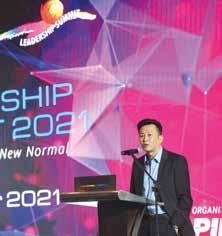
Mahadhir Aziz,
Chief Executive Officer of Malaysia Digital Corporation (MDEC) In his keynote address, Mahadhir said, “To enable digital transformation, we need to change the way we think and reframe our mindset. Being able to affect this change will greatly determine the success of our digital future.”
“For 25 years, together with your support and dedication, MDEC has been leading the way forward, changing the way we think and operate, and ultimately leading the charge towards our digital future – and, that future is now,” he added.
Mahadhir also highlighted that the way to successful digitalisation is to prepare for the journey ahead. “MDEC has set out to chart the course by equipping our people and businesses with essential digital skills, means and know-how. Under our “#SayaDigital Keluarga Malaysia” movement, we will strive to uplift the digital skills required,” he explained.
He shared that MDEC will be reaching out to as many Malaysians
as possible through the ‘Jelajah #SayaDigital Keluarga Malaysia’ programme. MDEC’s MyDigital Workforce programme is set to incentive companies up to RM23,600 to hire and train unemployed Malaysians for digital jobs. This programme also addresses the discrepancies between the skills that are sought by employers and the existing skillsets possessed by the local workforce.
MDEC’s Digital Skills Training Directory is a programme that guides talents to meet career needs for jobs in the digital economy with approximately 250 courses across focus areas such as data science, cybersecurity and animation. These programmes are available for business owners to future-proof their teams through upskilling.
“The digital economy’s contribution to the country’s GDP is expected to reach 25.5 percent by 2025 according to the 12th Malaysia Plan. To achieve this, it will require a whole-of-nation approach as we stand guided by the Malaysia Digital Economy Blueprint or MyDigital,” Mahadhir said.
Recognising the power of collaboration, he stressed that MDEC welcomes all forms of collaboration, technology solutions providers or even joint efforts in any digital national projects. “The contribution from the private sector in nationbuilding is of extreme importance, and we commend you for standing with us through tough times,” Mahadhir said.
Talking about two campaigns which have benefitted over 500,000 local entrepreneurs, he explains, “The ‘Go e-Commerce’ onboarding and the ‘Shop Malaysia’ online campaign under the Ministry of Finance’s Belanjawan 2021 is a perfect example of a successful public and private partnership. While MDEC may have provided the resources for local businesses to be onboarded onto e-commerce and e-payment platforms, it was the buy-in from the SMEs and e-commerce platforms that made it possible.”
Highlighting WCIT 2022 as the event that will propel Malaysia as the digital hub of ASEAN, Mahadhir said that the event will not only foster knowledge-sharing and partnerships that are necessary to drive further innovations in the IT industry, it also serves as a platform for countries, societies and businesses to come together and catalyse solutions that will uplift those that were severely impacted from the pandemic.
He acknowledged the Summit as a well-aligned initiative that follows MDEC’s vision to enable a progressive, innovation-led digital economy. In his concluding statement, Mahadhir stressed, “MDEC with the full support of the Ministry of Communications and Multimedia will continue to lead the digital economy forward, centred on ensuring shared prosperity for the ‘rakyat’.”
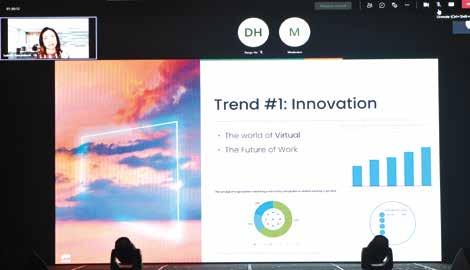
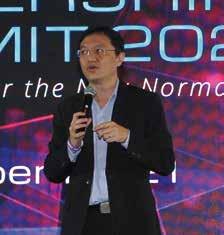

NOT THE NEW NORMAL BUT THE NEW FUTURE – TECH CHANGING THE WORLD
by Jacob Isaac,
Managing Director, Fusionex Group
Jacob pointed out that the pandemic has resulted in people taking digitalisation and transformation seriously, with the majority of companies accelerating their digitalisation activities by months instead of over 2 or 3 years. He
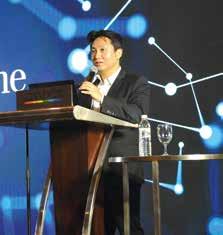
pointed out that many companies have begun to use technologies that they previously resisted with nearly two thirds accelerating their pace of deployment.
Highlighting the lifespan of the top global companies, Jacob said that in 1964 these companies were predicted to last 33 years, and in 2016 that number reduced to 24 years, and in 2027 these companies only have a tenure of 12 years. “That’s how fast business is changing, so the question for us is ‘if the world’s leading organisations can’t keep up, what makes us think that our businesses can survive?”, Jacob asked.
Although there is a strong fear of change, Jacob points out that change is now the future. He shared that successful entrepreneurs love change or have grown to love change. Jacob reminds that businesses have to be built around the wants, needs and desires of customers, and offer personalisation. In saying this, he points out that technology is key to the transformation of every organisation. “An enterprise is only as effective as its IT organisation or its technology partners,” he stresses.
Jacob highlighted that today organisations have to combine people and tech to harness the best of both worlds, ensuring people’s jobs and careers remain meaningful. He advises that organisations have to go beyond their comfort zones to succeed.

RANSOM-WHERE? YOUR LAST LINE OF DEFENCE
by Alicia Joseph,
Regional Director (SEA), Commvault Systems
Alicia said that COVID-19 is a gamechanger for digital transformation. She shared Gartner’s findings that seven in 10 boards of directors have accelerated digital business initiatives in the wake of COVID-19 disruptions. Amidst the acceleration in digital transformation, there is also the threat of ransomware. Alicia explained that this is due to data silos and lack of consistent policies leading to the increased risk of data leaks, ransomware and threats. She pointed out that 64 percent of CISOs feel at risk of suffering a cyberattack, and 75 percent of IT organisations will face one or more attacks.
A security reality check highlights that 58 percent of threats originate from within the organisations involving employees, ex-employees and partners; while 75 percent of companies infected with ransomware were running up-to-date endpoint protection. Meanwhile, 34 percent of businesses hit with malware took a week or more to regain access to their data.
In talking about data risks and the stalling of business growth, Alicia pointed out that business integrity gaps need to be addressed. The questions are ‘how much to invest for unplanned disruptions?’ and ‘where do the threats come from?’.
Alicia highlighted the need for a multi-layered security system for data; and that a ransomware protection and recovery framework should include identifying risks, protecting data, monitoring threat patterns, responding with strategic actions and recovering data. She adds that keeping data secure requires simple administration, flexible protection and recovery options, and efficient recovery.
CONNECTING THE DOTS: MAKING THE MOST OF MY TECH INVESTMENTS
by Muhammad Izlan Farid,
Systems Engineer, Veeam Malaysia
Izlan said that amidst the pandemic, many organisations have shifted to hybrid cloud solutions. He pointed out that COVID-19 has changed the IT landscape leading to 60 percent in cloud service growth, 48 percent in SaaS usage acceleration, and 715 percent increase in ransomware.
In talking about modern data protection, Izlan explains that this involves modern backup and recovery systems, reliable ransomware protection and data security, app agility with Kubernetesnative backup, and accelerate Office 365, AWS, Azure and Google.
Speaking about Veeam’s ecosystem, he explains that it involves cloud mobility, monitoring and analytics, orchestration and automation, governance and compliance, and backup and recovery. Izlan shared a user case whereby Veeam enabled the data recovery time to be slashed by more than 90 percent for a company in Malaysia, with a hyper-availability platform that is easy to use, stable and cost effective.
MEGATRENDS by Isabella
Kusumawati, Vice President & Managing Director, Southeast Asia, SUSE
Isabella pointed out that one of the key trends today is innovation in terms of virtual and future work. She also said that consumer behaviour has also changed, such as a 44 percent increase of in-house social media consumption; 70 percent of people spending more time on their smart phones and mobile devices; 80 percent higher traffic on media sites; 67 percent watching more news coverage; 28 percent more video streaming users; and, 39 percent increase in US video games sales in 2020.
Another trend Isabella highlighted is the digital tsunami and technology that has engulfed the world. She explained that COVID-19 is expected to push spending for trend technologies including cybersecurity and cloud.
The fourth trend she highlighted is the shifting of healthcare and supply chain, with digital healthcare capabilities while most supply chain use cases focus on provenance (track-and-trace).
She advises that businesses need to be agile and nimble, with the use of technology to scale businesses. Isabella also stressed that innovation must never stop, and applications need to run everywhere.
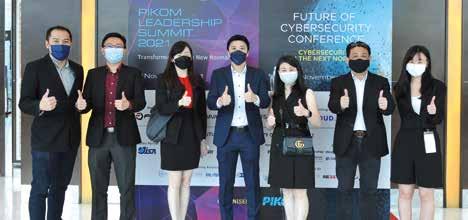
HOW TECH IS SHAPING THE NEW NORMAL –
Panel Session I
Justin Anthony, Executive Director of PIKOM moderated the session which featured three panel speakers who touched on the new normal and how tech empowered businesses and people during the pandemic.
Alex Hii
From an entrepreneur point of view on the impact of the pandemic on businesses, Alex explains that even before the pandemic his company had already embarked on the data security journey amidst providing business process outsourcing to its clients. This called for ensuring the company’s data infrastructure is secure, which is an on-going process.
Tay Chia Chia,
Country Director, Veeam Software Tay explained that being in an IT company that is constantly vigilant of threats and impacts to data, Veeam’s business did not face much adverse impact during the pandemic. They already practiced mobile working, with the processes and infrastructure prepared for mobility. She explained that staying connected with customers was extremely important.

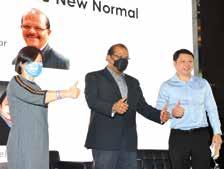
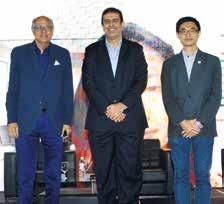
Amar Chhajer,
Senior Director APAC and Country Head, Malaysia UST Global Amar said amidst the pandemic, UST was enabling many digital transformations. There was more to do, supply faced constraints, demand increased and there was emotional impact, with a lot of churn in the market with high attrition rates around the world.
HARNESSING HUMAN CAPITAL FOR THE DIGITAL AGE –
Panel Session II
The session featured a discussion on human capital amidst the digital age.
Dato’ Ariff Farhan Doss,
Chief Operating Officer, HRDCorp In talking about redesigning human capital for the future of work, Dato’ Ariff said that there is a need to relook the roles and responsibilities we play. HRDCorp is involved in upskilling and reskilling of employees, and developing the potential in every Malaysian. He explains that we have the human resource but are not sufficiently developing human capital that we have due to development inequality. He points out that many Malaysians are monoskilled and collaboration is lacking among employees. For this reason, he stresses that soft skill is a priority. At the same time, employees are not given the opportunity to apply their soft skill learnings, thus Dato’ Ariff says that this has to be pushed topdown.
Professor Dato’ Dr Ansary Ahmed,
Founder President, Asia e-University Professor Dato’ Dr Ansary said that Malaysia is falling behind in
THE ROLE OF THE CIO IN TRANSFORMATION –
Panel Session III
Moderated by Stan Singh, PIKOM Councillor, the session addressed the role of the CIO in transformation.
Malik Murad Ali, IT Director,
Mydin Mohamed Holdings Berhad Malik shares that the toughest role of CIOs is evaluating people because people are delivering the solutions. He stresses that CIOs and the senior people of the organisation of people towards the changes. He adds that often, the challenges faced by CIOs is that employees with conservative work practices pose a challenge in acceptance of technology.
developing talents compared to neighbouring countries. Despite various blueprints, he adds that the country does not have an enabling framework for the digital era. He stressed that Malaysia needs to reimagine developing and harnessing our talent. He explains that industry and academia have to become smart partners in the education and training ecosystem is important in narrowing the gap in skillsets.
Dato Munirah Looi,
Founder & CEO, Brandt International Dato’ Munirah explains that the rate of change versus the growing gap in talent is real over the last few months. The technology curve is moving very fast which is impacting our people. However, she highlights that the organisation is not moving as fast compared to technology, and that technology and employee experience needs to be aligned in order to achieve success.
Johary Mustapha,
Founder & CEO, Forest Interactive Johary explains that to embrace technology, people have to have the right mindset. He talks about his company’s journey in scaling their talent, starting with mindset, bringing them together through a universal language which is English, and technology. Johary stresses that technology is here in Malaysia but people fail to adopt it, hence it needs to be addressed.
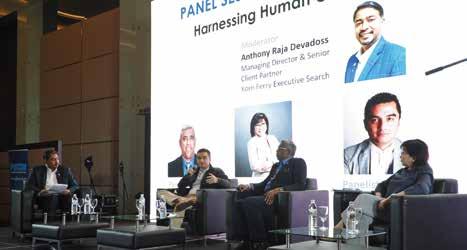
have to keep up with the trends of technology. Malik explains that people can come up with creative ideas but the CIO has to evaluate the value that the idea can bring to the business.
Ngoh Chee Hung,
Director of Corporate Information Centre, Help University Ngoh explains that digital adoption is a must in today’s environment, however in many organisations, adoption has to be considered from the perspective of the acceptance
Isabella Kusumawati
Isabella said that CIOs have evolved in their roles by becoming more strategic, productive and efficient. She explained that it is important for CIOs to understand the challenges faced in the respective industries.






